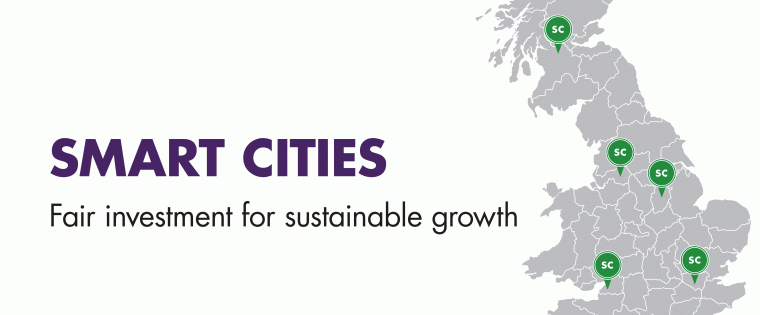Major rethink needed to prevent millions missing out on benefits of electric vehicles

- EV infrastructure roll-out risks exacerbating UK social divides, with some communities set to miss out on major health & financial benefits
- Restrictions on investment should be lifted or UK could fail to meet ambitious EV roll-out plan
- Ofgem’s powers should be devolved to ensure cities can develop their own bespoke energy policies and plans
- Findings follow engagement by Localis with local authorities, councils and business groups on the future of the UK’s cities
Social divides in communities could be deepened with millions of people set to miss out on the environmental and financial benefits of electric vehicles (EVs), a new report by Localis has found.
The report – ‘Smart Cities: Fair investment for sustainable growth’ – argues that outdated energy and infrastructure policies must urgently be modernised, and local network operators freed up to invest ahead of demand, if the government is to meet its ambitious targets for ensuring all new cars sold are zero-emission by 2040.
The report calls on government to devolve certain Ofgem powers to city regions and strategic authorities, allowing them to develop their own ‘smart city’ plans and energy policies built upon their own expertise and understanding of place.
Local authorities should be able to form their own consortiums using existing knowledge of their local areas, and also be empowered to work with private energy network providers to deliver the infrastructure they need for the future, the report recommended.
The report emphasised that families across the UK are at risk of sharing the cost for necessary new energy infrastructure, but not being able to access for themselves the benefits of EVs and other ‘smart’ technologies – driving further inequality between richer and poorer parts of the country.
Jonathan Werran, chief executive at Localis, said: “Without a change in regulation, behaviour and a wholesale transfer of powers for local energy policies, we risk a tale of two cities in our major urban centres – deepening levels of inequality between the prosperous and more deprived parts of town.
“A ‘devolution revolution’ in locally-regulated energy markets has the potential to accelerate the nation’s switch to clean growth, turn UK cities into powerhouses for sustainable and inclusive prosperity and improve livelihoods in towns and cities across the UK.”
Furthermore – while private energy network providers have invested heavily in building infrastructure that is fit for purpose today – the report found their inability to invest further unless there is proven need for it presents a major barrier to readying cities for smart technologies.
This restriction should be lifted if the UK’s energy network is to be fit for meeting future demand for smart technologies such as EVs – which will require a six-fold increase in the number of charging points by 2020 (Emu Analytics, May 2018).
The report authors also recommend that government should produce a standardised framework for how EV charging infrastructure is built and upgraded.
Localis head of data research, Joe Fyans, said: “The advancement of smart technology into households has huge potential for increasing the quality and efficiency of local public policy, but we have to make sure we have the nuts and bolts infrastructure in place to facilitate this change by securing the appropriate investment, and in a timely fashion.”
The report and its recommendations were informed by a series of roundtable events with local authorities, councillors and business groups.
George Lowder, chief executive, Transport for Edinburgh, said: “We’ll be taking note of the findings of this report here in Edinburgh, which is particularly timely as we consider city centre transformation, Low Emission Zones, future mobility and city development in 2019.
“A cleaner, smarter, Edinburgh is one that we are all striving for – including the increased use of EVs across our public transport fleets and an extended EV charging network for the city. The recommendations in the report today can help us to deliver this in a way that works for everyone.’’
Cllr Anna Richardson’s, city convener for sustainability and carbon reduction, Glasgow City Council, said: “Today’s report sets out many of the challenges and opportunities for Glasgow as we continue on our transition to a ‘smart city’.
“New technologies like EVs can play a part in decarbonising our transport system and improving our air quality – but they need to be rolled out fairly across the city, so everyone can benefit, and not exacerbate existing inequalities.
“The recommendations today can help ensure that government, and local authorities up and down the country, are able to oversee a successful shift to smarter technologies in a way that is fair, affordable and equitable.”
